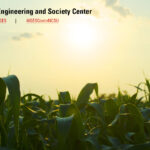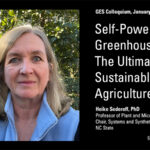
Heike Sederoff – Engineered Biology for Engineered Environments | GES Colloquium
Addressing the energy problem of greenhouse agriculture...Continue reading "Heike Sederoff – Engineered Biology for Engineered Environments | GES Colloquium"

Haydar Frangoul – CRISPR-Cas9 Gene Editing for Sickle Cell Disease and Transfusion Dependent β-Thalassemia | GES Colloquium
A presentation of data on using gene addition and gene editing technology to treat patients with sickle cell disease and transfusion dependent beta thalassemia....
Adam Sychla – Genome Writers Guild: Promoting Responsible Genome Engineering | GES Colloquium
The Genome Writers Guild asks the question: How do we promote responsible use of genome engineering?...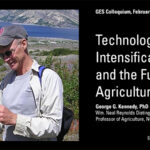
George Kennedy – Technology, Ag. Intensification, and the Future of Agriculture | GES Colloquium
This presentation will explore the challenges to agricultural sustainability associated with technology driven agricultural intensification....
Steve Lindow – Understanding Microbial Life on Leaves | GES Colloquium
Bacteria that live on leaf surfaces play important roles ranging from global precipitation to plant health...Continue reading "Steve Lindow – Understanding Microbial Life on Leaves | GES Colloquium"

Nicholas Jordan – Gene Editing for Agricultural Diversification? | GES Colloquium
Gene editing as a tool for agricultural diversification: perspectives from a multi-sector deliberative group....Continue reading "Nicholas Jordan – Gene Editing for Agricultural Diversification? | GES Colloquium"

Becky Goldburg – Supporting Actionable Research That Informs Conservation | GES Colloquium
How Pew's approaches increase the likelihood that research is applied in real world conservation decisions....
Ben Novak – Biotechnologies for Conservation and Their Intended Consequences | GES Colloquium
IN-PERSON COLLOQUIUM. Revive & Restore's "Intended Consequences" initiative aims at rebalancing the risk-benefit equation around the use of biotechnologies in conservation practices....3/29 GES Colloquium Cancelled
Statement regarding cancellation of the upcoming Colloquium on March 29, Panel: Narratives and Storytelling in the Public Communication of Science and Technology...
Faith Kearns – Getting to the Heart of Science Communication | GES Colloquium
A 21st century guide to communicating science on emotional and contentious topics...Continue reading "Faith Kearns – Getting to the Heart of Science Communication | GES Colloquium"
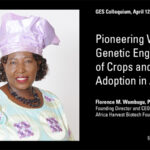
Florence Wambugu – Pioneering Work in Genetic Engineering of Crops and It’s Adoption in Africa | GES Colloquium
Factors influencing the adoption of GE crops in Africa, and Dr. Wambugu's pioneering work on GE sweetpotato and with the Africa Biofortified Sorghum (ABS) project. ...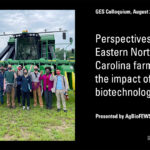
AgBioFEWS Cohort 2: Perspectives of Eastern North Carolina farmers and the impact of biotechnology | GES Colloquium
The second AgBioFEWS cohort discusses lessons learned from visiting Eastern NC....
Amy Huang – The Quest to Reimagine Meat | GES Colloquium
Explore the state of alternative protein research and learn how universities can accelerate our transition to a better food system....Continue reading "Amy Huang – The Quest to Reimagine Meat | GES Colloquium"
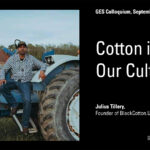
Julius Tillery – Cotton is our Culture | GES Colloquium
Julius Tillery, Founder of BlackCotton.Us, will discuss why cotton is our culture....Continue reading "Julius Tillery – Cotton is our Culture | GES Colloquium"
